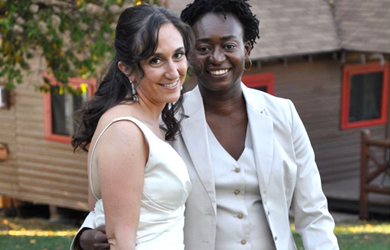One thing about this job is that every time you start to think that you have seen every argument imaginable about why letting gays get married with destroy America, you come across something that proves you wrong. And via Amanda Marcotte, who got it via Dan Savage, we found just one of those things in this new and novel argument from David Klinghoffer, a Senior Fellow at the creationist Discovery Institute.
Writing on Beliefnet, Klinghoffer offers up the thoughts of Joshua Berman, author of “Created Equal: How the Bible Broke with Ancient Political Thought” on “How Women Will Be Hurt by Gay Marriage.” The gist of the argument is that “on the issue of same-sex marriage, we have much to learn from the writers of ancient Rome” where “homoeroticism [was] fully accepted” and, as such, women just simply couldn’t compete.
Men, we learn from ancient Rome, will enjoy sex with other men, if there is no social censure. Now, all of this should be fine for us as well — after all, we should let free choice and tolerance reign.
The real problems begin, however, when we read what these writers had to say about marriage. Consider this piece from the first century BCE poet Catullus (Carmen 61:134-141), in which the poet addresses himself to a bridegroom on the eve of his nuptials:
“You are said to find it hard, Perfumed bridegroom, to give up Smooth-skinned boys, but give them up… We realize you’ve only known Permitted pleasures: husbands, though, Have no right to the same pleasures.”
The social history behind this piece is clear: once they’ve experienced sex with other men, Catullus tells us, men are unsatisfied with what their new wives provide them. Notice that the poet is unconcerned about the husband’s dallying with other women — it’s the other men around that threaten the marital union.
If Catullus addressed the bridegroom on the eve of his wedding, the satirist Martial (Book 11, Epigram 43) depicts the reality of married life itself. As satire, the section is too bawdy to be reprinted here, but the sanitized version goes like this: A woman chastises her husband for continuing to dally with male acquaintances. He counters that many other married men are doing it as well. Desperate, she offers to service him in the same way that his male suitor does. He rebuffs, concluding, that she just can’t satisfy him the way his suitor can.
And so now we come back to the idyllic day of free choice and tolerance envisioned by the gay and lesbian movement. It turns out that that day has winners and losers. The winners — big time — are homosexual men, because the historical record shows that they can expect their potential pool of partners to expand exponentially. Of note here is that this expanded pool of partners accrues to gay men, but not to homosexual women. At the risk of getting too explicit, I leave it the reader’s basic grasp of anatomy to figure out why in ancient Rome a man who found pleasure in a woman, could also find pleasure in a man, while the record shows that a heterosexual woman rarely found sexual satisfaction in the company of another woman.
The losers from all this will be the vast majority of women. With full social sanction given to homoerotic activity, the historical precedent suggests that tomorrow’s women will have a harder time finding and holding on to suitable men. As women will suffer, so will the vitality and stability of the nuclear family.








